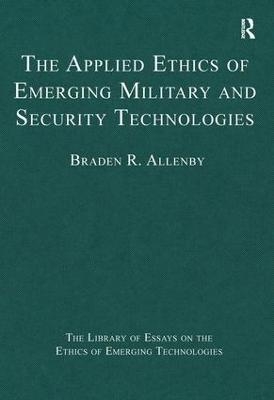
The Applied Ethics of Emerging Military and Security Technologies
Routledge (Verlag)
978-1-4724-3003-8 (ISBN)
Braden R. Allenby is Lincoln Professor of Engineering and Ethics, and President’s Professor of Civil, Environmental and Sustainable Engineering, and of Law, at Arizona State University, USA. He is the founding director of the Center for Earth Systems Engineering and Management, and the founding chair of the Consortium for Emerging Technologies, Military Operations, and National Security, at Arizona State University, USA.
Contents: Introduction. Part I Changing Context and Overview: The implications of emerging technologies for Just War theory, Brad Allenby; The ethics of killer applications: why is it so hard to talk about morality when it comes to new military technology?, P.W. Singer; Summary, National Research Council and National Academy of Engineering; Unrestricted warfare, Qiao Liang and Wang Xiangsui; International humanitarian law and the challenges of contemporary armed conflicts, International Committee of the Red Cross; Technology as dialectic: understanding game changing technology, Noetic Corporation; New capabilities in warfare: an overview of contemporary technological developments and the associated legal and engineering issues in Article 36 weapons reviews, Alan Backstrom and Ian Henderson. Part II Robots and Autonomous Systems: International governance of autonomous military robots, Gary E. Marchant, Braden Allenby, Ronald Arkin, Edward T. Barrett, Jason Borenstein, Lyn M. Gaudet, Orde Kittrie, Patrick Lin, George R. Lucas, Richard O’Meara and Jared Silberman; Terminating the terminator: what to do about autonomous weapons, Wendell Wallach; On banning autonomous weapon systems: human rights, automation, and the dehumanization of lethal decision-making, Peter Asaro; Losing humanity: the case against killer robots, Human Rights Watch; The case for ethical autonomy in unmanned systems, Ronald C. Arkin. Part III Unmanned Aerial Vehicles and the Transition from Military to Civilian Systems: Pandora’s box? Drone strikes under jus ad bellum, jus in bello, and international human rights law, Stuart Casey-Maslen; Moral predators: the duty to employ uninhabited aerial vehicles, Bradley Jay Strawser; Lawfulness of a lethal operation directed against a US citizen who is a senior operational leader of Al-Qa’ida or an associated force, US Department of Justice; What the drone debate is really about: it’s not privacy or state power, Daniel Rothenberg; The golden age of privacy is over: but don’t blame drones, Brad Allenby. Part IV Cyberconflict and Cybersecurity: Computing ethics War 2.0: cyberweapons and ethics, Patrick Lin, Fritz Allhoff and Neil Rowe; Cyber conflict and international humanitarian law, Herbert Lin; Jus in silico: moral restrictions on the use of cyberwarfare, George R. Lucas Jr.; The ethics of cyberwarfare, Randall R. Dipert; ‘Cyberation’ and Just War doctrine: a response to Randall Dipert, James Cook. Part V Genomics and Neuroscience Engineering: Enhanced warfighters: a policy framework, Maxwell J. Mehlman, Patrick Lin and Keith Abney; National security neuroscience and the reverse dual-use dilemma, Gary Marchant and Lyn Gully; A multidisciplinary approach to an ethic of biodefense and bioterrorism, Victoria Sutton. Name index.
| Reihe/Serie | The Library of Essays on the Ethics of Emerging Technologies |
|---|---|
| Verlagsort | London |
| Sprache | englisch |
| Maße | 174 x 246 mm |
| Gewicht | 1270 g |
| Themenwelt | Natur / Technik ► Fahrzeuge / Flugzeuge / Schiffe ► Militärfahrzeuge / -flugzeuge / -schiffe |
| Recht / Steuern ► EU / Internationales Recht | |
| Recht / Steuern ► Öffentliches Recht | |
| Sozialwissenschaften ► Politik / Verwaltung | |
| Sozialwissenschaften ► Soziologie | |
| ISBN-10 | 1-4724-3003-4 / 1472430034 |
| ISBN-13 | 978-1-4724-3003-8 / 9781472430038 |
| Zustand | Neuware |
| Haben Sie eine Frage zum Produkt? |
aus dem Bereich


